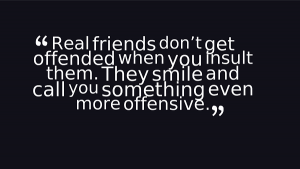Not that long ago I had an experience that made me think about the difference between “being insulted” and “being offended.” In today’s society where it seems like there is always someone offended by something, no matter how innocuous or harmless the “something” might be, it’s almost become fashionable to be offended. What’s worse, the idea that being offended seems to mean someone owes you something in reparation for having caused that feeling. Here we get to where people who have been “triggered” feel they are owed something (and that “something” can be truly ridiculous) simply because someone did something that was offensive to them. If you have this conversation long enough, terms like “snowflake” and “pansy” start getting thrown around and then we’ve moved from the realm of offensive to the realm of insulting. They are far from the same thing but in today’s world the difference has been all but lost.
Now, before I get too much farther into this, let me share definitions for these two words: insult and offensive. Far too often, in my opinion, people claim they are offended by something when the reality is they just don’t like it or it challenges their outlook in some way. That’s different from being insulted.
Insult (noun): an insolent or contemptuously rude action or remark; affront. something having the effect of an affront: (verb) (used with object): to treat or speak to insolently or with contemptuous rudeness; affront. to affect as an affront; offend or demean.
Offensive (adjective): causing resentful displeasure; highly irritating, angering, or annoying: i.e. offensive television commercials. unpleasant or disagreeable to the sense: i.e. an offensive odor. repugnant to the moral sense, good taste, or the like; insulting: i.e. an offensive remark; an offensive joke. pertaining to offense or attack: the offensive movements of their troops.
“…insolent or contemptuously rude action or remark.” That is pretty specific. Insolent means “boldly rude or disrespectful.” Something contemptuous is “scornful or disrespectful.” Respect and the lack there of, disrespect, are very personal things.
Going back to the experience I had that partially inspired this entry, a man I consider a friend of mine did something that I considered a personal attack and insulting. I communicated such to him and expected his response would be, “Oh, I’m sorry. I didn’t realize you’d take it as an insult. I meant it as a joke.” Instead his response was (paraphrased), “Well, I guess you need to grow up some and be less sensitive.”
Here was my mental challenge: I didn’t tell him I was offended; I told him I found his action insulting. In previous conversations he and I have agreed that far too many people get offended far too easily in today’s world of overly developed and often weak sensibilities. I don’t recall that we had ever discussed the difference between offending someone and insulting someone. One is unintentional and really is more about their response than your intent. If you insult someone… if you say or do something to a specific someone and it’s insulting to them, then that’s different than doing something that may be perceived as offensive to a large group of people.
I’m not sure I can articulate this properly or that I’m doing a very good job of it. Let me give another example.
 Not that long ago I paid a friend of mine a compliment on his appearance. It was a compliment given in earnest and not meant as a joke in any way, nor was any disrespect meant (as might have been if it had been a joke). That friend, however, took it as disrespectful due to circumstance. That perception of disrespect was communicated to me and I had a choice to make.
Not that long ago I paid a friend of mine a compliment on his appearance. It was a compliment given in earnest and not meant as a joke in any way, nor was any disrespect meant (as might have been if it had been a joke). That friend, however, took it as disrespectful due to circumstance. That perception of disrespect was communicated to me and I had a choice to make.
One response I could give would be to say, “Hey… I didn’t mean it in any disrespectful way. It was a compliment,” and then be defensive about my position. I meant no offense. I meant no insult.
The other response I could give was the one I chose. “Hey, I apologize. I didn’t mean any disrespect and didn’t realize you’d take it that way. Again, I’m sorry for any disrespect perceived.”
The challenge with the second response is this: I like to learn from my mistakes (as much as my life might be an example to the contrary). So, having issued what was intended as a respectful and sincere compliment, fully expecting that it would be welcome and appreciated, and then having discovered that it wasn’t – no matter how circumstantial that response may have been – I will never again issue a compliment of the same nature. I will not risk disrespecting this friend a second time, but that outlook itself alters the nature of our friendship. It means that I will have to more carefully monitor what I say no matter what I’m thinking.
It might seem a nitpicking difference between being insulting and being offensive. To me, I can’t be insulted without being offended but I can be offended without being insulted. In the end, the friends and family I most enjoy being around are those I can freely speak my mind with and not worry about them being insulted or offended. I have veteran friends who regularly greet me with terms most would find insulting, but because of the nature of our relationship I find them to be terms of endearment. I guess it really is all a matter of perception.
